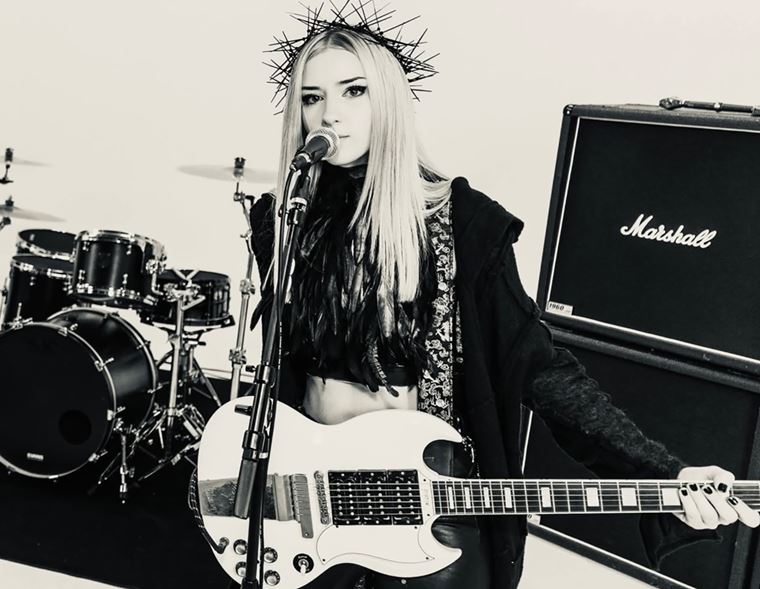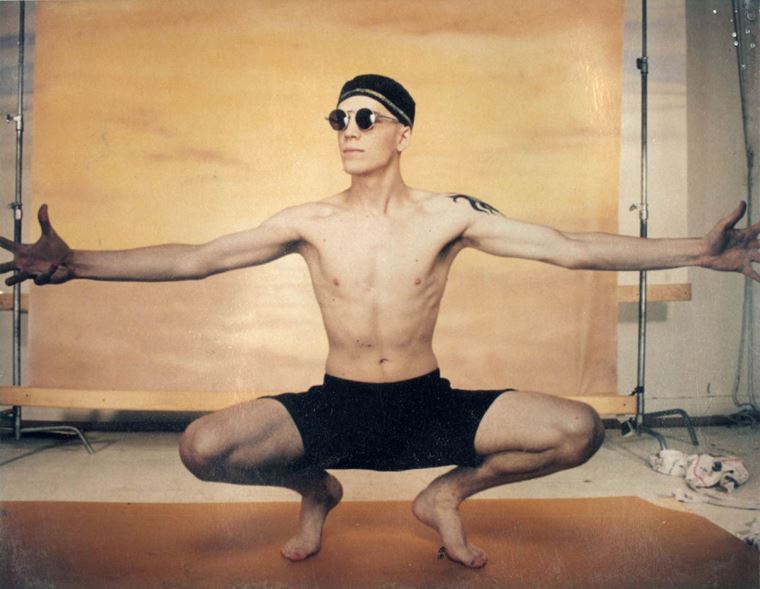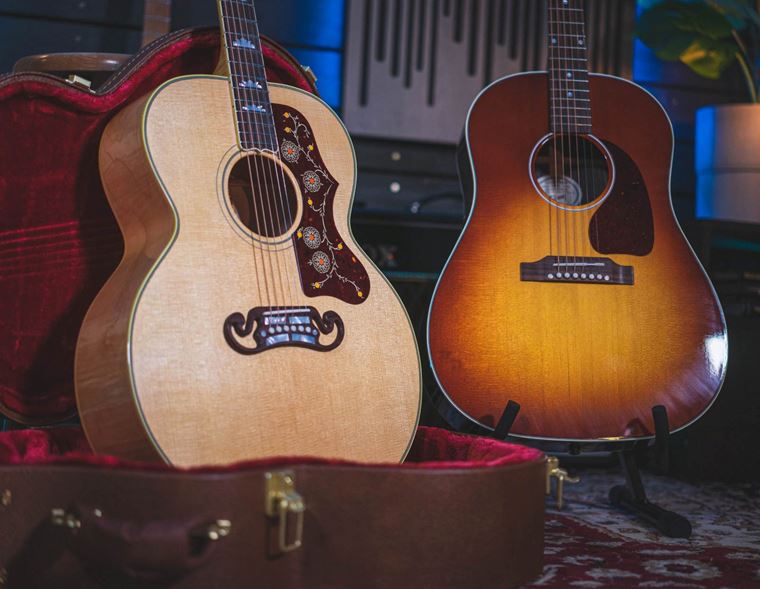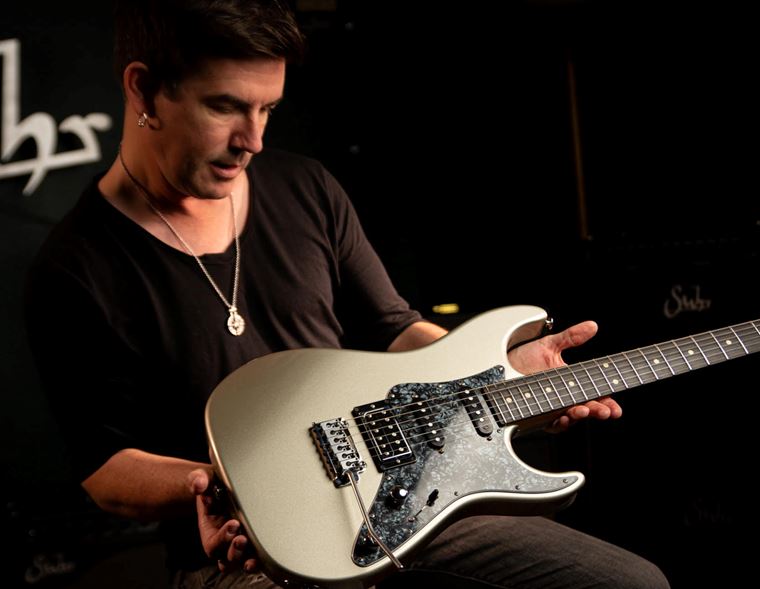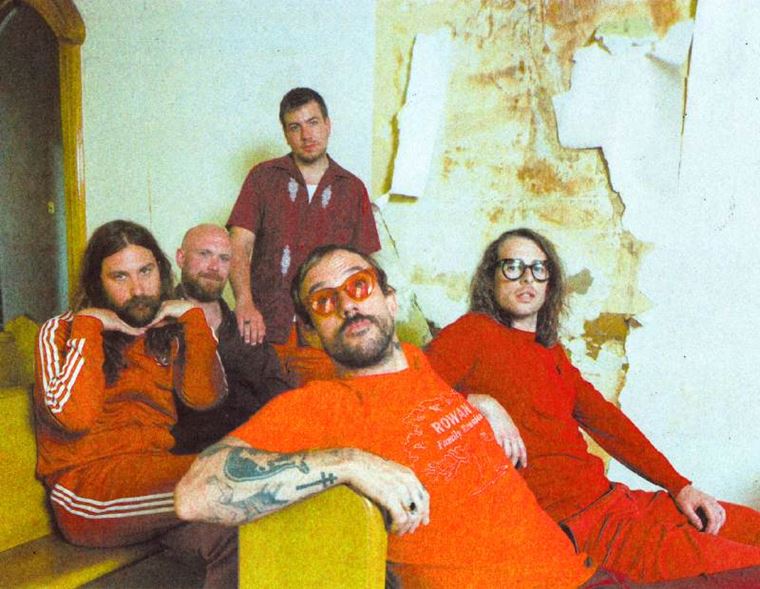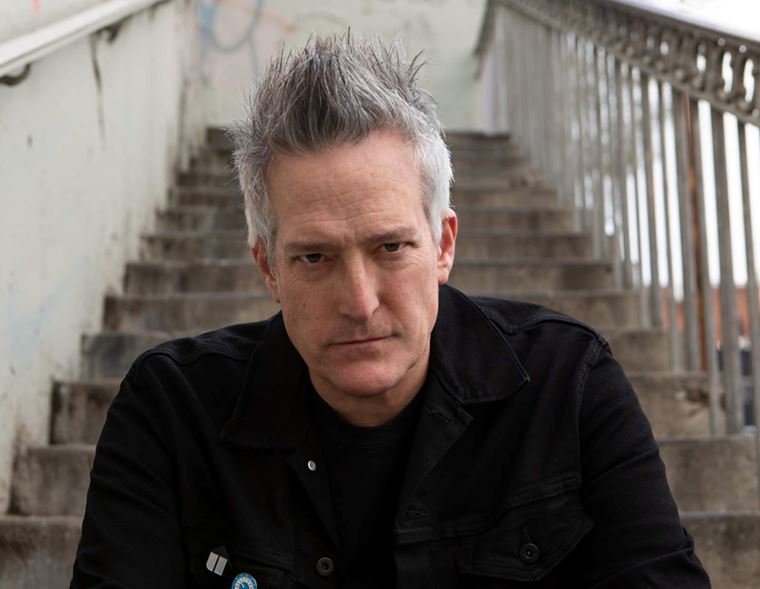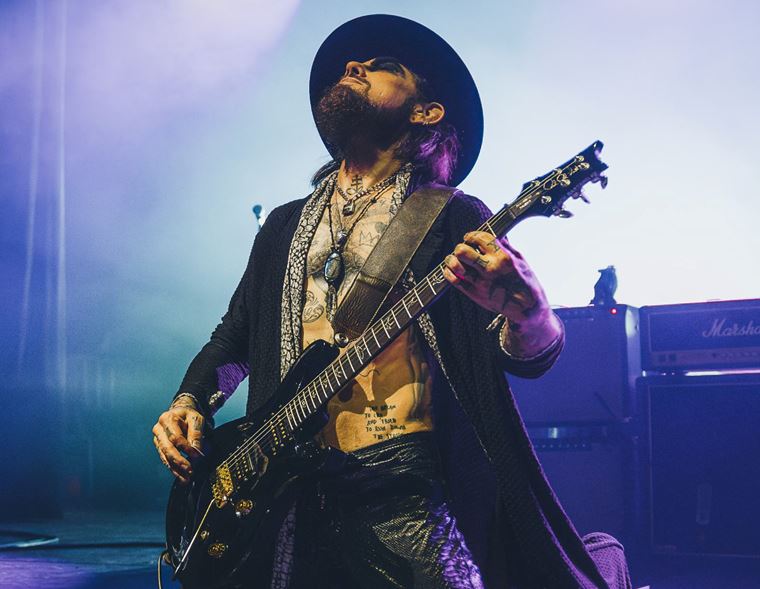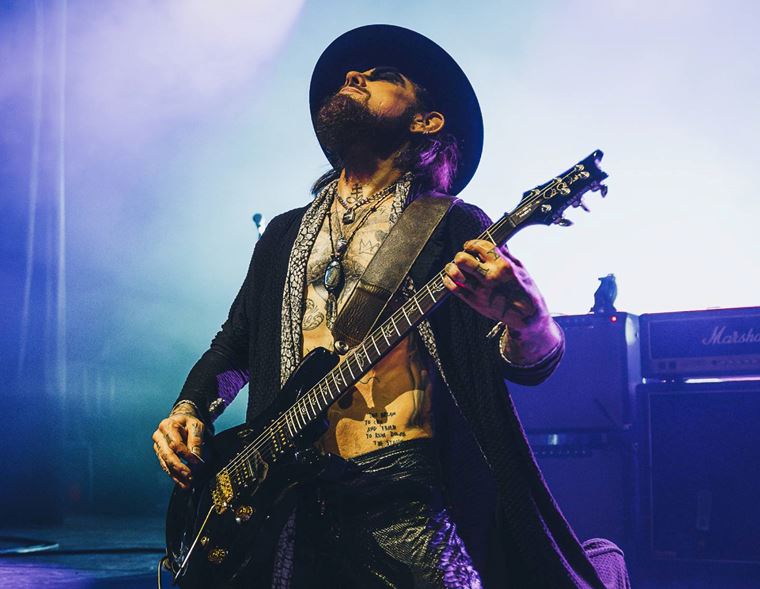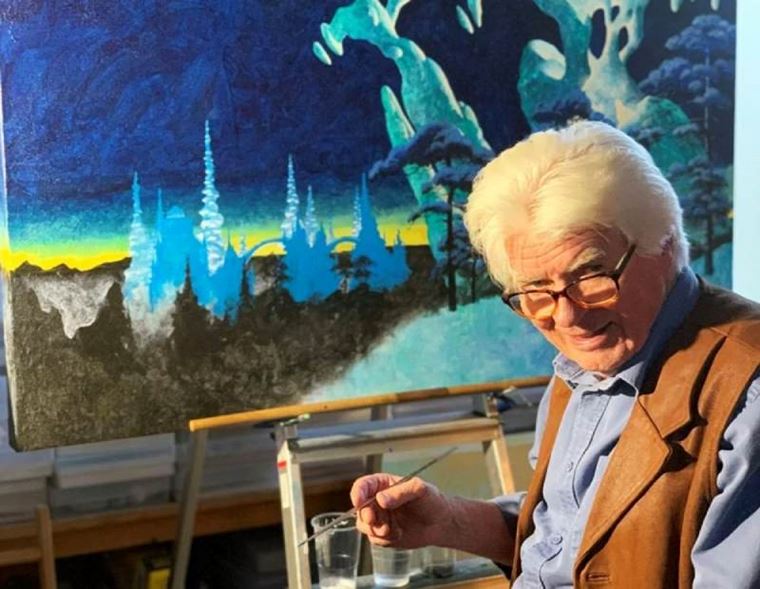MASTODON interview! Bill Kelliher on Hushed and Grim
Published on 12 November 2021
Some bands make more of an effort than others.
The best bands are the ones who create entire worlds for their music to live in. They invite listeners into this special universe to explore and be a part of the collective art. All great bands have this quality and Mastodon most certainly do! From their beginnings in Atlanta 20 years ago, the sonic and visual language they’ve built has been extraordinary, evoking the four elements (each of the first four albums related thematically to Earth, Fire, Water and Air) and bringing diverse cultural touchstones like Moby Dick and Rasputin together in one colourful, multi-faceted world that’s quite their own.
They also changed and defined the parameters of heavy metal music, too. Mastodon, a four piece with three lead singers and no distinct frontperson, have brought banjo-style fingerpicking into metal in a way that is fresh and authentic, whilst delivering bludgeoning riffs on 6-string guitars tuned to low A. They’ve redefined subject matter for rock songs, created two decades’ worth of classic anthems and done it all of their own terms. The songs are epic, the playing is astonishing, even the artwork is magnificent.
In a phrase, Mastodon are the full package.
This month sees the release of Hushed and Grim, the first time the band have released a double album. Never short on ambition, this particular effort sounds at times Olympian in its hugeness, and at others, intimate and confessional. It’s no secret that Hushed and Grim is in a large part a tribute to Nick John, the band’s manager, friend, mentor and early champion, who sadly died in 2018. His loss, devastating for all band members, has evidently spurred them to even greater heights that we’ve had justifiable cause to expect. It’s classic Mastodon, yes, but there is much, much more going on here, too. It’s a masterpiece.
We were lucky enough to be able to join guitarist and songwriter Bill Kelliher for a Zoom chat from his Atlanta home studio. We got the lowdown on Mastodon’s collective dynamic and writing process, the cathartic effects of music and, of course, a ton of gear chat, including some exclusive announcements about a new guitar and a new pickup!
Hushed and Grim Interview
guitarguitar: So yeah, the new record, Hushed and Grim, is a fantastic sounding album! It sounds like a career-best to me. How does it feel for you, having just completed it?
Bill Kelliher: You know, honestly, every record that we do, we always try to push ourselves to explore new territories and kinda outdo ourselves, not so much reinvent – we’re not at that point yet – but we just have so many fuckin’ ideas (laughs) and riffs, you know what I mean? You take a couple of years on the road in between records...I try to write as much as I can, especially when I’m getting older, because I want to put out as much music as physically possible. Good music! So yeah, it’s probably fair to say that Hushed and Grim is probably our best achievement so far.
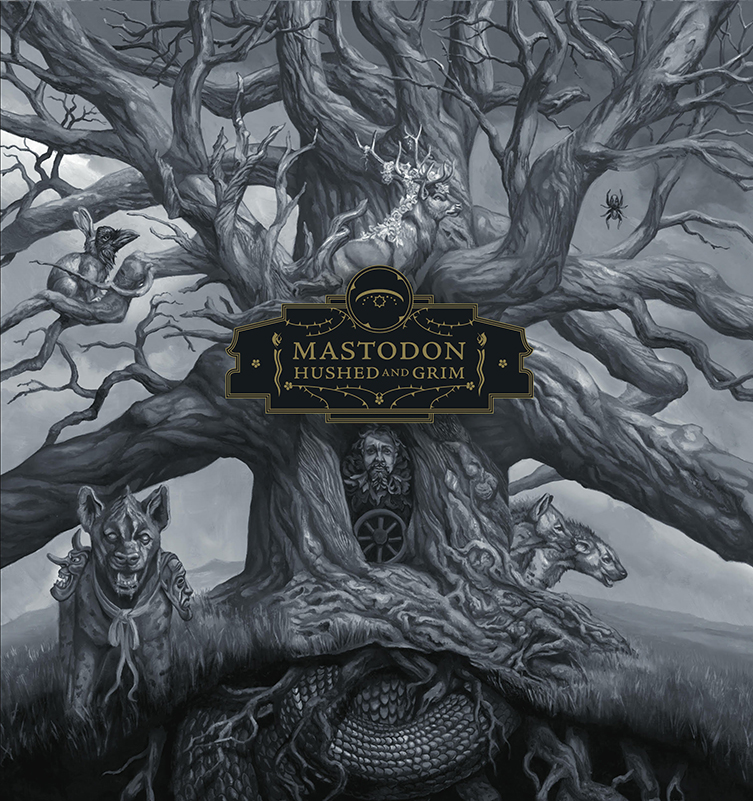
GG: It’s a double record. Was that the initial idea, going in? You just mentioned you’d been writing so much.
BK: We just had so many ideas. We went in thinking we’d take 12 songs and just pick the best hour of that, because all of us agree that anything over, like, 55 minutes, people start to get bored. But we couldn’t decide which songs to cross off, because they all seemed like they fit so well, together as a story. It’s kind of like: you write a book and then your publisher says, ‘Hey, you have to take out three chapters’. How do you do that? You can’t! It’s like, ‘So, why don’t we just leave them in there?’, you know what I mean?
I think, even pre-pandemic, we had a lot of stuff written, 20 songs or something. I felt like I had so much stuff. I’m always cultivating riffs, dumping them into Pro Tools and I’ve got millions and millions of files, all kinds of stuff. Some of it was left over from before Emperor of Sand, some riffs I had left over that never made it onto the record. That’s just the way it goes.
"To us, there is no filler. We pour our heart and soul into every song."
But we had, like, 20-25 songs, not fully developed but close, you know? We couldn’t go into the studio with 25 songs, we had to cut it down. We went through every song and 15 were just about finished. Our producer, David Bottrill, was only contracted to do 12 songs, but like I said, when it came down to choosing, we couldn’t decide which three to axe, so we just went, ‘Hey, what if we do a double album?’ It’s a difference! (laughs)
GG: Yeah, yeah. For sure.
BK: Some bands set out to do a double album and just fill up space. I don’t feel like that was the case with us. When we record music and songs, and write lyrics and concepts and all that stuff, every song is like your baby. There is no filler, at least, to us, there’s no filler. We pour our heart and soul into every single song. Every single song, I can honestly say, we fuckin’ did our best.
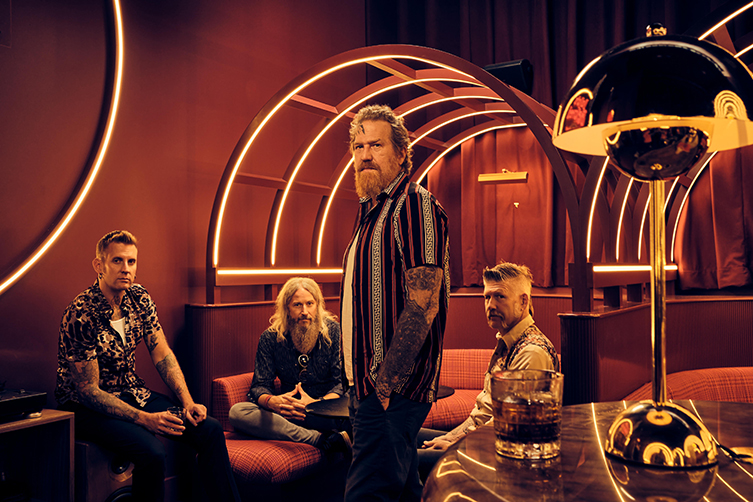
GG: It shows! And it has consistently shown throughout Mastodon’s whole career. What you have as a band is one of the strongest back catalogues of heavy music that’s out there. I wondered: do you feel the pressure of that when you’re coming up with new material? You put so much into each record. It’s a very difficult standard to set for yourself.
BK: I don’t think so, not really! I just don’t think about it. I know Mastodon. I know us and I know that we work really well as a unit and that whatever we come up with is gonna be...y’know, it’s gonna be fucking great! (laughs) I have complete faith in our band, is what I’m trying to say. But I understand your question. Especially after Crack the Skye, that was such a pivotal moment for us, but some people say that about Leviathan: ‘That was your best record’. That’s the one that sells the best, I know that! A lot of people say, ‘Remission is your best record’, and I’m like, Well, I disagree! (laughs) We were just getting to know each other and we were just laying down the basic stuff. We were travelling in a van, we only had, like, three weeks to write and record the record, and it’s so much different now. it definitely shows. Some bands never change their formula. Look at Slayer or AC/DC: two great bands but their records all sound very similar. It’s the same formula because it works.
"That's the best compliment that I could ever get, that my music helped someone else through a hard time"
GG: Maybe one of the reasons why Mastodon don’t have that is because you have four songwriters all contributing, with three lead vocalists. It’s not the same singer on every song, and one song might be a ‘Bill song’ and another might be a ‘Troy song’. That’s actually one of the things I was going to ask. If you’re all bringing stuff to the table, how do you determine which songs make it and which don’t?
BK: We just know, like, I would say the foundation of everything...I’ve been doing a lot of writing, the past two records I’ve been at the forefront. Writing most of the riffs. Brann will come down to my studio and he and I will hash these riffs out, and believe me, there’s stuff I’ve written where he’s like ‘Meh, that might sound too much like this song off Blood Mountain’ and I’ll change it around and write something different. He and I will hash everything out, at least the stuff I write and the stuff he writes, until we think it sounds really good. Now we need Brent to play a crazy fucking solo, or see what he does with it. Now we need Troy to sing here, we kinda map a lot of it out. Brann will do a lot of the singing, he’s been singing a lot.
We’ve just been working hard! Usually, the two of us, when we first build the skeleton of the songs, we bring that to the other guys, and we’re like, ‘Hey, we’ve got about 75% of the record right here’. This time, Troy had like 3 or 4 songs. Dagger and Had it All were two that Troy wrote. I own a studio now, I’m the co-owner of West End Sound Studios so we can go in there pretty much any time we want.
So, Troy went in there and laid some stuff down on his own, sang it and he played it for us. We were like, ‘Holy shit man, this is gold! This is great!’ Had it All is a very touching, sad, emotional song, and it’s very fuckin’ cool. I was like, ‘It has to be on the record!’, and that’s just from hearing the very skin and bones of it. Dagger too, because it’s so fucking weird! That’s all Troy. Troy writes, but he’s kinda quiet, he doesn’t really push his stuff. I feel like I’m usually hogging it with my riffs, like ‘I get this song! And I got this song! And this song!’
We sent David Bottrill everything, like all 25 songs, and when he heard Dagger, he said, ‘This song should be on the album because it’s very strange and it’s a departure for Mastodon’. So, Troy’s songs get in there.
And then Brent had a couple songs: Peace and Tranquillity and The Beast. Brent’s got a million riffs and ideas as well. I feel like lately, we’re almost kind of going in different directions, but somehow we manage to bring the two together, which we did with those two songs. Brent and I are very, very opposite (laughs) as people, and as songwriters and guitar players, which is what makes Mastodon what it is. I like to be completely prepared for everything in life, and present and upfront. Well-rehearsed, like, ‘here’s my songs, here it is to a click trick, here’s the chorus’. Very anal about songwriting and having everything in order, having it nice and tight before I show it to the guys.
"If all four of us walked into a room and said 'Hey, let's write a song!', it'd be chaos!"
Brent’s kinda like, we get to the studio and he’s like, ‘Ah, I got this’ (mimes casually playing something complicated on a guitar) and I’m like, ‘How many times does it go? What does this do?’ and he’s like, ‘I dunno, we’ll figure it out’ (laughs). Jaguar God, that song off of Emperor of Sand, that song and Toe to Toe is Brent, at the 11th hour, saying, ‘Well, I got some songs! (laughs) I got this and I got that.’ We just kinda make them in the studio and that how the other songs on Hushed and Grim of Brent’s came together, too. There’s nothing wrong with that, he’s just in a different mind space. The past few records, like I said, I’ve just been really pushing to get my stuff out because I have so much of it overflowing in my brain, I gotta get this stuff out! It’s cathartic to get it out. ‘I’ve had this idea forever, and it needs to see the light of day!’ That’s me.
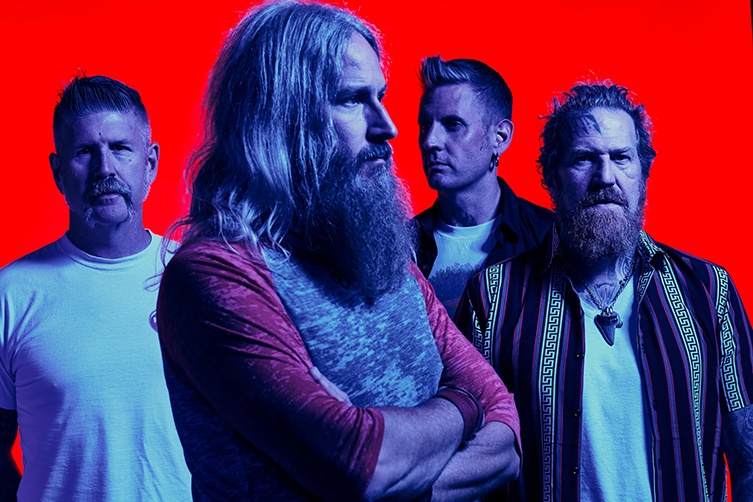
Brann, he had written a lot of stuff, some stuff where I was like, ‘This is almost like solo album material, dude!’ because he was playing guitar, singing, playing drums, playing bass and some if it was cool but not quite ‘Mastodon’, you know what I mean? He doesn’t really play guitar, he’s very rudimentary, so when he shows me stuff, I try to make it more interesting for myself and add more notes and stuff. He’s like, ‘No, no ,no, no, it’s simple, I know it’s easy for you to play, but this is how I want it to be’. Like Gigantium, that was a Brann song. It’s repetitive and simple, but it’s awesome and the vocals are carrying the song, the guitars are kinda taking a back seat.
The second half of the song was Brann and I. He wanted a second half that goes in a different direction. He and I hammered out the rhythms for that and that just came out fuckin’ epic. We work together and both see eye to eye, that’s why I choose to sit with Brann and has the skeletons of everything out. If all four of us walked into a room and said, ‘Hey, let’s write a song!’ It’d be chaos! (laughs) It doesn’t really work. We learned that in the past. But everybody had their songs on the record.
GG: Of course, the record is at least partly a tribute to your departed friend and mentor, Nick John. You mentioned earlier about the catharsis of getting a bunch of music out into the world. Were there cathartic feeling attached to this tribute to your dear friend?
BK: Uh, I mean, sort of. Nothing’s ever going to bring him back, and this record’s probably gonna remind us more and more (laughs) of Nick, and the fact that he’s gone, you know? It’s really meant to be like a tribute. Same thing with Emperor of Sand: it wasn’t cathartic. For me it was about meeting my mom. My mom was dying of cancer and I was there with her. I had my guitar with me in the hospice when she was laying in bed, on the verge of carrying on to the next world. I was writing right next to her, just trying to keep my chin up and it’s more cathartic to just get the riffs out of my body and out of my head. Just feeling like I accomplished that. There’s nothing that can heal the loss of your best friend or your mother, wife or whoever.
"Nick John was everything to us. We wouldn't be who we are or where we are, without him"
But I feel like we went over the top with a tribute to this guy. This man, Nick John, was everything to us. I feel like we just went all out, and ‘Everything is dedicated to you, man’. We wouldn’t be who we are, where we are, without him. He made life, and Mastodon, just a better place. Honestly, it’s like: death, loss and sadness, all that shit, it somehow just awakens our creative abilities in some dark way. I know that our fans – we’re all human and everybody’s got a story to tell, everyone’s got baggage and fuckin’ shit going on that you don’t know about from the outside and we should all keep that in mind when we’re getting angry with somebody we don’t know – this record is like, we’re all going through this fuckin’ loss and we can all be in it together. Everybody can relate.
I get emails, Facebook messages, posts, you name it, from people who are like, ‘Oh my God, you’re record came out the day my brother died’, or this person committed suicide, any kind of tragedy and you’re record helped me through it, made me feel better knowing that you guys are going through this and I’m not alone. It’s like medicine, it’s medicinal, and that’s the best compliment that I think I could ever get, that my music helped someone else through a hard time. Also, besides doing that, it’s just a rockin’ song! (laughs) Or someone learned it on guitar. There are so many facets of Mastodon and the music that we write besides just being a heavy metal band. Or winning a Grammy or some shit. It’s emotional music, on a personal level, and it’s helpful to people. That’s what brings me the most joy about being in this band.
GG: Yeah, I was gonna to bring that up before you literally just said it: I think this record’s gonna be helpful to a lot of people. Sometimes even a chord progression or a musical moment can trigger an emotional release that people can take in all kinds of ways. Mastodon are particularly good at that.
"I love to write dissonant, arpeggiated parts, just cause it kinda takes you out of your comfort zone for a second"
BK: It’s just the vibe, you know? It’s the whole vibe. Not a long of people sing and write about the loss of their best friend, I mean, people do, there’s the whole Goth thing where everybody’s sad and they’re wearing black like they just came from a funeral, but sometimes you read the lyrics and they’re not super deep. All that stuff is cool, and we’re kinda in that realm with this album – maybe we’ll attract the goth crowd, I dunno (laughs) – but to me it’s just deeper than that. It’s so fuckin’ real, there’s nothing contrived about it at all. It comes from a real place and that’s what makes it so believable.
GG: Yeah! And also, there’s an element of triumph with Mastodon’s music as well. Sometimes it’s even just the ability to know when to absolutely smash a riff, because there’s a lot of catharsis in that! The part at the end of Where Strides the Behemoth from Remission has one of the greatest riff moments that I’ve ever come across! That has its own power as well.
BK: Thank you.
Bill Talks Gear
GG: Now, it’s a bit of a tangent, but let’s chat about guitars!
BK: Yeah!
GG: So, for the new record, were you using your signature ESP guitars?
BK: Mainly, yes. The thing is, I have a lot of ESP Sparrowhawks. I have probably ten of them and a lot of them have different pickups in them, everything from the Lace Dissonant Aggressors, to Lace Nitro Heavies, which sound great, to my new pickup which hasn’t come out yet but I designed it with Mojotone, it’s called the Hellbender.
GG: Cool.
BK: I use that a lot, it’s a very well-rounded sound, lots of bass response, just one of the best sounding pickups so far. Also, Motor City pickups, I like those a lot, Bare knuckle makes a great pickup. What else? I used some Seymour Duncans, some of those are in my Sparrowhawks, the Distortion ones, they sound great. But I would pick and choose for certain parts which guitars I would use, like this one (reaches over and pickups up a cool black ESP Sparrowhawk with a tortoiseshell coloured pickguard), we call it ‘The Ribeye’ because of the pickguard. I used this one a lot. Actually, the pickups in here are Mojotone, I think these are the first set of prototypes they sent me. I ended up using those the most.
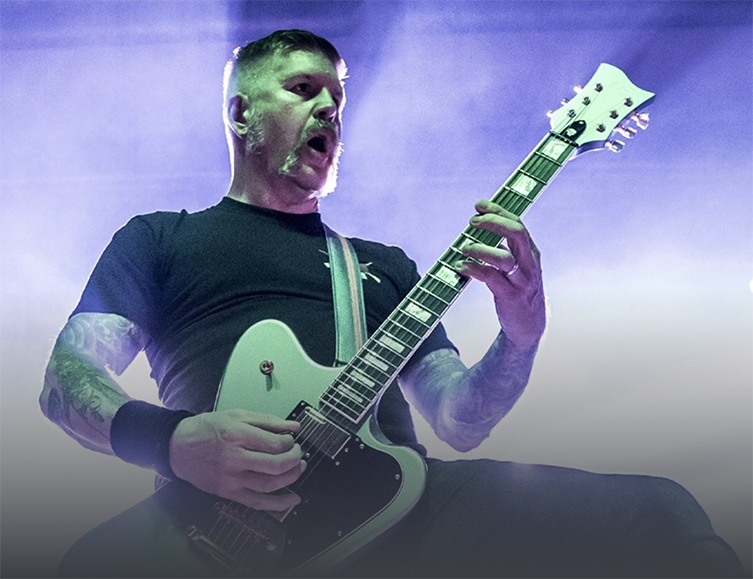
Of course, I use a lot of my Les Pauls, to pepper in some big thick meaty riffs here and there. Also, on a lot of the cleaner stuff, I use an ESP Ron Wood. It’s like a Telecaster shape. Man, I’ve played a lot of Strats and Fenders and nothing sounds as good as that. That guitar sounds fucking great. It’s magnificent. I have a new prototype ESP which is like a double cutaway, silverburst, which is probably about this thick (demonstrates a substantial size with fingers), I’m not even exaggerating. It weighs about 12-13 lbs, which in comparison, this ESP is probably about 7 lbs? it’s very heavy (laughs). I’ve been using it live and I’m like, ‘Man! I thought Explorers were heavy!’ It just sounds amazing. I think it has Seymour Duncan Antiquity pickups in it.
Also, Banker guitars. There’s a guy named Matt Hughes here in town, he makes some of the beast guitars I’ve ever played. He made me an all-gold Explorer which is absolutely phenomenal. He’s one of the only people who are licensed ot make Gibson guitars for Gibson.
GG: Oh really? Is he like a custom builder for them?
BK: Yeah, he actually a banker by day, he works in a bank. Guitars are called Banker. You’re gonna fall in love with his guitars! He sets up all my stuff from now on. Man, I can’t say enough good things about the guy.
GG: Fantastic!
BK: He knows his wood, basically.
GG: That’s what it always comes down to. There are a couple of playing/technique things I’d love to talk to you about. One of the main things I love about Mastodon over the normal metal riffing is the more arpeggiated stuff, the string skipping stuff that rings out despite being really distorted. They are still very clear sounding and that’s not a very easy thing to do. Do you have any particular practices for when you’re recording to make those arpeggio parts sound the way they do?
BK: Almost every song I write has an open string in there somewhere. We love to write dissonant arpeggiated parts, just cause it kinda takes you out of your comfort zone for a second. When two notes are a half step apart and they give a kinda weird natural wave in your head. Even when you’re hitting the low A string and you’re hitting it extra hard, it goes out of tune and then slowly goes back in tune. Things like that is part of our trademark sound, you know?
GG: Definitely.
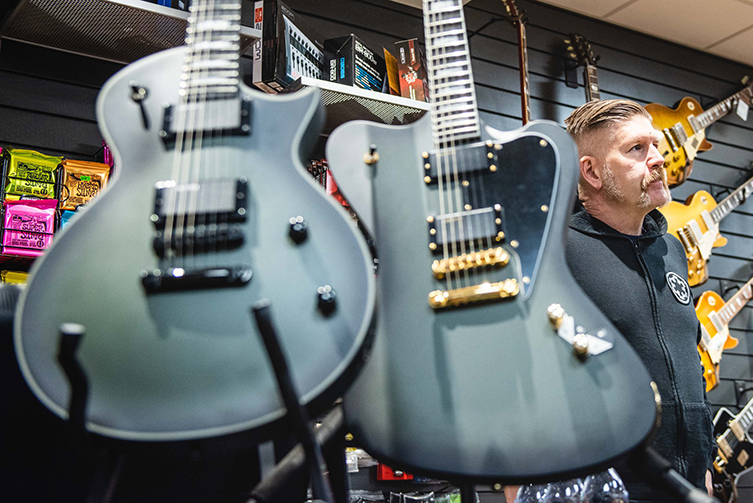
BK: But I think a lot of it has to do with doubling guitars when you’re tracking in the studio, and also not using quite as much distortion as you may think. I try to dial back the distortion. In fact, I’d love to mention that yesterday I got a Victory amp called the Super Kraken, which is an English company. Goddamn does it sound fucking awesome! (laughs)
GG: Haha, nice! Well, we sell them so that’s good news.
BK: It's fucking great. So, also I wanna mention before we go, is that I’m also working with another company called STL Tones. I’ve built a plugin with them and it’s called Tone Hub, it’s an artist signature preset pack. So that should be coming out pretty soon. It’s basically all the amps and guitars I used on Hushed and Grim and they’re all in presets. If you were interested in, like, I want to hear Bill’s Sparrowhawk in the single coil split through the JCM 800 or the Friedman, or even my Silvertone amp I use, there’s like 70 different presets of mine in there. Each one is from the actual recording, so it’s pretty cool.
GG: Given that you were the author of the original sounds, does these presets stack up? Did you A/B them and go, ‘That’s good enough’?
BK: Yeah, I recorded everything, sent it back to them and when they returned them, I played along. Without even tweaking anything, it sounded great. Sometimes you get those things and they sound crackly and I dunno, but I think these sound really good.
GG: Sweet!
BK: I wouldn’t have signed up with them if I hadn’t.
"Troy writes, but he's kinda quiet, he doesn't really push his stuff. I feel like I'm usually hogging it with my riffs!"
GG: One thing I’m always interested in is picks. I’ve noticed you quite often you use a sharp looking pick. You still using those?
BK: Oh yeah, I always go with these right here. (holds up a green Tortex Sharp with a custom graphic)
GG: Aha! Is that a Dunlop Tortex?
BK: Yeah. I get them custom printed, this one has my dog on it (laughs).
GG: I suppose the last question I have for you is about those dissonant semitone notes you touched on earlier. Those unusual tonal intervals that go a bit ‘seasick’. Did you stumble on that, or was there something you listened to that was an influence for that whole vibe?
BK: I dunno. I mean, when I was growing up...my dad’s from Ireland, and he was in the music business when he first came over. He owned a hi-fi business. I was like, ‘Dad, I wanna play guitar’, and he brought home the U2 War album. The Edge was this fuckin’ weird guitar player back then! He used a lot of open strings and he was kinda minimalist. Obviously he uses a lot of delay and minimal notes: he’s quite changed now but back in those days he was this weirdo: who plays like that? Where’s the rock? You know what I mean? (laughs) I think it all started there, then maybe some Black Flag, listening to punk rock. Some punk rock was just made to kind of anger you, annoy you, a lot of noise and feedback. And then The Melvins and Neurosis and Kim Thayil from Soundgarden had a lot to do with it. Different tunings, um, I’m trying to think where else it came from.
"Brent and I are very, very opposite as people and as songwriters and guitar players, which is what makes Mastodon what it is"
Brent always played a lot of open string stuff when we first met. We were both tuning down low, Drop A. Actually, it was Drop B but it was my idea to drop a full step, to make things even lower! So he was already on that tip and a lot of stuff he was playing was the same. I think it just kinda grew from there. Just the open A and hitting the high A when you’re tuned a full step down with a drop A. We just went from there, seeing what sounded cool. To me, when you hit an open string, like a high string, it just kinda punctuates the riff. It gives it almost like a different, more percussive sound like a bell, especially if you bend it a bit, go out of tune...it makes it more interesting. It’s just something I started diving into and now everything I play has got some sense of that in there.
With that, Bill had to dash for another interview. We managed to cover a ton of ground, and Bill was very generous with his answers, being so open, honest and forthright. Though, having listened to their music for years, what else would I have expected?
It’s great to have Mastodon back, and they’ll be furiously touring in both the US and Europe, so keep an eye on things via the official Mastodon website. Hushed and Grim is out now and you can get that masterpiece in your ears wherever you source your music.
We’d like to thank Bill for giving up his time for us, and for being such a fun, interesting person to talk to. Thanks also to Emma for setting us up, and to you, for reading another of our exclusive interviews! We hope you enjoyed it, and if you did, please click through to our guitarguitar interviews page for many more, including Nine Inch Nails, Steven Wilson, Opeth and many more!



